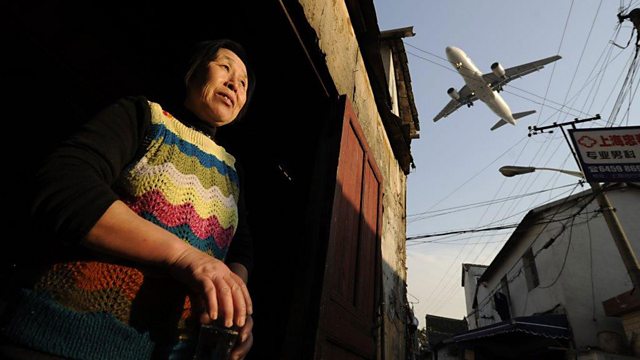Living Under a Noisy Flightpath Can Cause Mental Health Problems
Can living under the flightpath of an airport increase your risk of developing depression?
Globalisation means that many more of us are living close to busy airports. And from Phoenix, Arizona to London, England there are groups campaigning against new runways and concentrated flight paths. The noise made by planes as they land and take off has been show to affect sleep and even cardiovascular health. But until now the evidence for a link to problems with mental health has been patchy.
Chris lives more than 15 miles from London’s Heathrow airport. Two years ago he was woken up by the noise from a new concentrated flight path right over his house. His family had moved there to de-stress and he found the noise difficult to live with and he had to seek medical help.
But how common is Chris’s experience?
A major new study from Germany supports the theory that even moderate noise levels – around 50-55 decibels, equivalent to the level of a normal conversation – can increase rates of depression by 17%. The 5-year-long study followed the experiences of a million people living near Frankfurt airport.
The project leader of the NORAH study, epidemiologist Professor Andreas Seidler from Dresden University, explains how the data indicated that for every 10 decibel rise above the “conversation” level, the risk of developing depression rose by 10%. He says that further research is needed to make sure the effect isn’t the result of other factors like road traffic noise.
Self-driving, autonomous cars are on their way and the first fatality occurred just recently, causing worry for those behind the technology. But the hope is that they will one day make our journeys safer, faster and more environmentally friendly. But how will other drivers, cyclists and pedestrians react to a car that’s driving itself? Will they be wary, or perhaps more pushy, knowing that in the end the driverless car will do everything it can to avoid a collision?
The first UK trials that the public can take part in are just starting in an outdoor lab in London. The Gateway project offers people the chance to ride in an autonomous car. Claudia got into the driver’s seat in a vehicle simulator at the Transport Research Laboratory in the south of England, to meet the chief scientist Dr Alan Stevens.
Automated cars are designed to drive quite close together – and “communicate” electronically so this can happen safely. But in one experiment where they are alongside non-automated cars in a simulator, the drivers of the standard cars have been observed copying the smaller gaps between vehicles – which could be dangerous. Dr Stevens says in this “mixed” traffic there could be signs or lights on the driverless vehicles, to warn other drivers to keep their distance.
Transport can save lives when medical help is needed urgently. In parts of rural Uganda 75% of maternal deaths are due to delays in getting to a clinic or to a larger hospital for a caesarean section. So the charity Mama Rescue has created a clever system where pregnant women are given vouchers for local motorcycle taxis called boda bodas to pick them up when they’re in labour and take them to a clinic.
If further help is required, taxis can take them from the clinic to hospital – as their medical notes are sent via SMS so that staff can be prepared for each emergency. Peter Klatsky is an American obstetrician and gynaecologist who set up the charity. Whilst training midwives, in rural western Uganda, about how to deal with any complications of labour, he heard that delays of 20 hours for an ambulance were not uncommon. Dr Klatsky says it’s difficult to assess how many lives they have saved – but they have done 1,400 emergency deliveries. He’s now exploring an opportunity to scale-up the programme in partnership with UNICEF and the Ugandan Ministry of Health.
Bicycle maintenance and mental health might not seem like they have much in common. But in the Scottish city of a Glasgow a scheme called the Common Wheel aims to improve mental wellbeing as well as teach people new skills. It’s based in a bicycle workshop and people referred by mental health professionals pick an old bike, then meet once a week to strip it down and rebuild it from scratch, so that they end up with a shiny new bike. One of those who’s benefitted from Common Wheel is Christopher. He says the opportunity to do something practical came at just the right moment in his recovery, when his medication had started to settle – and that re-building a bike has helped him to feel alive again.
Neil, who’s been running the workshops since the programme started, says the workshop has to stay tidy and ordered – so the right tools can be found quickly. The social intervention compliments any psychological and medical treatments – and a hundred people complete the build your own bike course every year.
Photo credit: Getty Images
Last on
Clip
-
![]()
Driverless cars
Duration: 04:34
Broadcasts
- Wed 13 Jul 2016 21:32GMT���˿��� World Service except East and Southern Africa & News Internet
- Thu 14 Jul 2016 01:32GMT���˿��� World Service Americas and the Caribbean
- Thu 14 Jul 2016 02:32GMT���˿��� World Service Online, Europe and the Middle East & UK DAB/Freeview only
- Thu 14 Jul 2016 03:32GMT���˿��� World Service East Asia & South Asia only
- Thu 14 Jul 2016 04:32GMT���˿��� World Service Australasia
- Thu 14 Jul 2016 06:32GMT���˿��� World Service Europe and the Middle East & East and Southern Africa only
- Thu 14 Jul 2016 14:32GMT���˿��� World Service except News Internet
- Sun 17 Jul 2016 19:32GMT���˿��� World Service East and Southern Africa
Podcast
-
![]()
Health Check
Health issues and medical breakthroughs from around the world.



